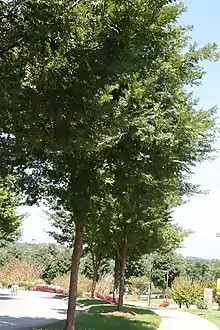Ulmus parvifolia 'Emer II' = Allee
The Chinese Elm cultivar Ulmus parvifolia 'Emer II' or 'Emerald Vase' (selling name Allee) was cloned from a tree planted circa 1910 on the University of Georgia campus at Athens.
| Ulmus parvifolia 'Emer II' | |
|---|---|
 Ulmus parvifolia Allee, North Carolina Arboretum, Asheville, NC | |
| Species | Ulmus parvifolia |
| Cultivar | 'Emer II' or 'Emerald Vase' = Allee |
| Origin | US |
Description
Allee can reach a height of about 15 m, with a more upright crown shape than its stablemate Athena, its spread approximately 13 m, with arching branches bearing medium green, glossy leaves turning orange to rust red in autumn. The exfoliating, mottled bark has a puzzle-like pattern, and is considered attractive.[1]
 Bark
Bark Branching
Branching
Pests and diseases
The species and its cultivars are highly resistant, but not immune, to Dutch elm disease, and unaffected by the Elm Leaf Beetle Xanthogaleruca luteola.[2] As with the species overall, damage caused by Japanese Beetle is relatively slight (< 8% defoliation).[3]
Cultivation
Allee is reputedly drought tolerant, but in the elm trials conducted by Northern Arizona University at Holbrook, Arizona, Allee proved unsuited to the hot, arid climate and sustained over 50% mortality in its first year, as did its sibling Athena. The tree is being evaluated in the National Elm Trial coordinated by Colorado State University. Allee has been introduced to Australia and Europe , and was marketed briefly in England by the Thornhayes Nursery, Devon.
Accessions
- North America
- Bartlett Tree Experts, North Carolina, US. Acc. no. 2001-166
- Holden Arboretum, US. Acc. no. 98-26
- Brenton Arboretum, Dallas Center, Iowa, US. One tree, acquired 2009. Acc. no. not known.
- Scott Arboretum, US. Acc. no. 2000-006
- Smith College, US. Acc. nos 302, 33603
- University of Idaho arboretum, US. One tree. Acc. no. 1998010
- U S National Arboretum , Washington, D.C., US. Acc. no. 64442
Nurseries
- North America
(Widely available)
- Australasia
References
- Santamour, Frank S.; Bentz, Susan E. (May 1995). "Updated Checklist of Elm (Ulmus) Cultivars for use in North America". Journal of Arboriculture. 21 (3): 122–131. Retrieved 20 June 2016.
- "Elm Leaf Beetle Survey". Archived from the original on 2011-07-19. Retrieved 17 July 2017.
- Brady, C., Condra, J., & Potter, D. (2008) Resistance of Landscape-suitable Elm (Ulmus spp.) Cultivars to Japanese Beetle, Leaf Miners, and Gall Makers. 2008 Research Report, Nursery & Landscape Program, pp 15, 16. University of Kentucky.
External links
- http://www.ces.ncsu.edu/depts/hort/consumer/factsheets/trees-new/cultivars/ulmus_parvifolia.htm%5B%5D Ulmus parvifolia cultivar list.
- https://web.archive.org/web/20030413074605/http://fletcher.ces.state.nc.us/programs/nursery/metria/metria11/warren/elm.htm Return of the Elm - the status of elms in the nursery industry in 2000. Warren, K., J. Frank Schmidt and Co.
